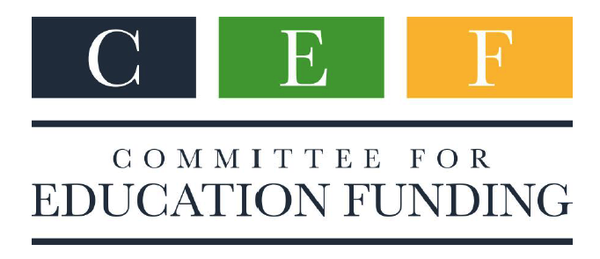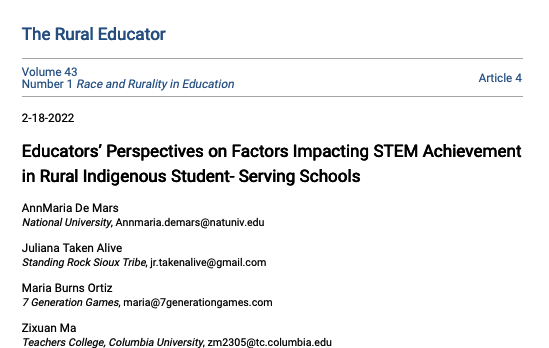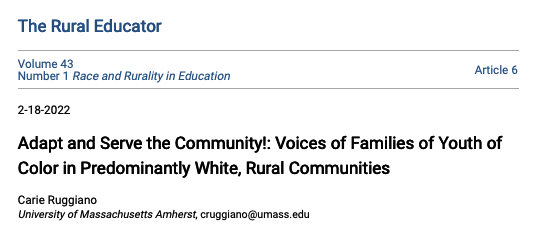| 2022 NFARE Sponsorship Opportunities |
|
|
|
We are seeking partnerships with sponsors who share our vision and commitment. Together, with your investment, we will be able to offer rural educators a dynamic and impactful professional learning and networking experience. |
|
| Research Participants Request |
|
|
|
 |
The project is funded by the Association for Healthcare Research and Quality (AHRQ). To be specific, we are looking to work with school teams in rural schools who are currently implementing Tier I of an MTSS for behavior (or PBIS) and would like to add evidence-based Tier II supports in the form of either a group-based CBT intervention or a behavioral intervention (for younger students). The purpose of the project is to provide training and coaching to "in-house" school mental health professionals (i.e., counselors, social workers, school psychologists) to implement protocols for Coping Power and CBT for Anxiety Treatment in Schools (CATS) and, for those students who are not yet in 4th grade or do not meet the criteria for inclusion but still engage in problem behavior, Check-in/Check-out. I have attached a flyer describing the project to this email. Currently, we have 19 schools enrolled in the project and we need to increase our enrollment to 30 schools by the middle to the end of May. Tom mentioned that he thought you might be able to help us in terms of providing some advice or possible connections to rural elementary and middle schools that would be interested in such a project. |
|
|
|
| Federal Updates: NREAC & CEF |
|
|
|
| White House Announces Actions For Bolstering Clean School Infrastructure And Transportation To Support Student Learning And Health |
|  |
The Biden-Harris Action Plan for Building Better School Infrastructure will: - Invest in More Efficient, Energy-Saving School Buildings: The Department of Energy (DOE) is launching a $500 million grant program for schools that will lower energy costs, improve air quality and prioritize schools most in need, enabling schools to focus more resources on student learning.
- Improve Classroom Air Quality through the American Rescue Plan: The Administration is supporting states, school districts, and local communities in leveraging American Rescue Plan Elementary and Secondary School Emergency Relief resources to address school infrastructure needs—like repairing, upgrading, or replacing ventilation systems; purchasing air filters and portable air-cleaning devices; and fixing doors and windows so that schools can stay open for in-person learning.
Expand Clean and Safe School Transportation: The Environmental Protection Agency (EPA), with support from the Department of Energy (DOE), is releasing new online resources to help school districts and other eligible recipients prepare for the $5 billion Clean School Bus Program created by the Bipartisan Infrastructure Law—with the first opportunity to fund clean and electric buses opening later this spring. - Help Schools Access Resources and Best Practices: The new toolkit will further support school participation in the Clean Air in Buildings Challenge, which the Administration recently launched to reduce the spread of COVID-19 and improve indoor air quality in buildings of all kinds, including schools. The Department of Energy is also announcing the inaugural honorees of the Efficient and Healthy Schools Campaign, which provides technical assistance to school districts seeking to implement high-impact indoor air quality and efficiency improvements that will reduce energy bills and improve student and teacher health.
|
|
|
|
|  |
I. Policy Intelligence and Education News - COVID-relief package rescinds $500 million of unclaimed HEERF dollars – The new Bipartisan COVID Supplemental funding bill (text, summary, cost estimate) pays for $10 billion in health preparedness by rescinding previous pandemic relief, including $500 million of unclaimed funding that the American Rescue Plan allocated to institutions of higher education (IHEs) in the Higher Education Emergency Relief Fund (HEERF). Of the total $39.5 billion in HEERF, almost all were awarded by formula to IHEs last spring. The Department of Education (ED) gave IHEs another chance to apply for the funding last month, and most of the remaining funds are being rescinded in this bill. Senators have raised several different objections about the possible amendment process and one of the other funding offsets, so passage this week is not guaranteed.
- Administration to announce another extension of the pause on student loan repayment – It’s being reported that today the White House will announce another extension of the current pause on collecting repayments and accruing interest on federal student loans. Repayments and interest are scheduled to resume on May 1, but reportedly the Administration will extend the moratorium through August 31.
- White House action plan on school infrastructure – On Monday, the White House announced an “Action Plan for Building Better School Infrastructure” that details existing funding and information available from multiple agencies to support student learning and health by upgrading school facilities with clean energy and transportation services. It includes American Rescue Plan funds for the Department of Energy, ED’s Elementary and Secondary School Emergency Relief Fund, Environmental Protection Agency’s clean school bus program, and the Agriculture Department’s loan and grant programs to support rural schools.
|
|
|
|
The NATIONAL SIGNATURE PROJECT AWARD is awarded annually to an outstanding and innovative classroom project that exemplifies the very best in rural, place-based education. The National Signature Project Award is open to any rural classroom teacher in the United States, and it is jointly funded by the Rural Schools Collaborative (RSC) and the National Rural Education Association (NREA).
The grant application deadline is FRIDAY, APRIL 29, 2022 by 11:59 P.M. The maximum award is $2,500. PLEASE NOTE: We recognize that your project could be subject to change due to Covid-19, and that is okay. Conceptual proposals are fine at this time, and, if needed, we will work with the Award recipient to move forward to highlight their work.
In addition to the maximum award of $2,500, The Rural Schools Collaborative and National Rural Education Association will compensate both the awardee's travel and registration fees for their attendance to The 2022 National Forum to Advance Rural Education - happening in Green Bay, Wisconsin October 20-21, 2022. Place-based education gives meaning to learning, strengthens the bonds between school and community, and instills pride in the cultures and histories of rural places and small towns. We hope you will consider submitting an application to this program. |
|
| RSC & NREA: Rural Teacher Job Board |
|
|
|
| The College of Education at Frostburg State University (FSU) |
|
|
|
SENIOR RESEARCH ASSOCIATE The College of Education at Frostburg State University (FSU) seeks applications for a full-time, exempt contingent II Senior Research Associate for the continuation of a 5-year grant-funded position. Salary commensurate with qualifications and experience. Responsibilities: The Senior Research Associate will be involved with the daily operations of Maryland Accelerates grant activities, including curriculum/assessment development and execution, career ladders development, data analysis, and reporting. Additionally, the position will be involved the implementation of teacher residency experiences, professional development activities, grant management, and reporting to ensure project goals are achieved. Strong organizational and writing skills are critical for the successful candidate, as are clear communication skills, problem-solving skills, and adaptability. The position will require managing multiple priorities and working directly with the Project Investigator (PI), Project Managers, College of Education faculty, Teacher Resident candidates, elementary and secondary coordinators, education leaders, and personnel from partner school districts in Western Maryland. Limited travel within Western Maryland and nationally to conferences may be required. Minimum Qualifications: Bachelor’s degree and 3 years minimum experience with data collection, research, assessment, and/or data analysis is required; Past work experience with data collection and reporting. Experience managing or supporting grants or research projects, understanding and demonstrating skills in up-to-date technology and data analytics to inform educational decision-making. Preferred Qualifications: Master’s Degree Term of Employment: 4/20/2022 – 9/30/2023 About the University: A member institution of the University System of Maryland, Frostburg State University is a public, comprehensive, largely residential regional university offering programs in the sciences, education, business, the arts, and humanities at both the undergraduate and graduate levels. FSU prides itself on being a dynamic, learning-centered institution that emphasizes teaching with opportunities for professional development and research. More than 5,000 students enrolled yearly. About the Area: FSU is located on a scenic 260-acre campus in the mountains of Western Maryland, a region rich in history, quaint shopping areas, and eclectic cafes and food choices. The Western Maryland region is considered to be a four-season outdoor mecca of recreational experiences offering activities such as hiking, mountain biking, water sports, snow skiing/boarding, golfing, climbing, etc. Frostburg offers a family-friendly college town feel with easy access to major cities like Pittsburgh, Washington, DC, and Baltimore. If you are looking for insightful colleagues, energetic students, and a great place to work and call home in a region with unlimited adventure-seeking opportunities, FSU is for you! To Apply: If you wish to apply, please visit http://frostburg.peopleadmin.com/postings/1965. Along with your application, please provide the following: 1) a resume; 2) a cover letter specifically addressing the requirements in this advertisement, and 3) names and contact information for three professional references. For assurance of full consideration, please submit materials by 4/11/2022 Frostburg State University (FSU) has made the safety of our students, faculty, staff, and our surrounding community a top priority. As part of that commitment, the University System of Maryland (USM) recently announced that students, faculty, and staff are required to be vaccinated against COVID. As a prospective and/or a new employee at FSU, you will be required to comply with FSU’s vaccination protocol. Proof of full vaccination will be required at the time of employment. Prospective or new employees may seek a medical or religious exemption to the vaccination requirement. FSU is proud to be a diverse and inclusive multicultural university. Frostburg State University welcomes and encourages women, veterans, and minorities to apply and seeks to recruit and retain a diverse workforce. FSU is an Equal Opportunity Employer. Appropriate auxiliary aids and services for qualified individuals with disability will be provided upon request. Please notify us in advance. |
|
|  |
This study addressed the question, “What factors do experts perceive as impacting STEM achievement of students in rural schools with predominantly Indigenous students?” A thematic analysis of interviews with 40 educators with a depth of experience identified six major themes: holistic STEM education, the inclusion of local culture in STEM education, highly qualified staff, STEM curriculum and instruction, technology, and STEM funding. These themes were interrelated. Holistic education demanded a more individualized curriculum and required more highly qualified staff who could adapt the curriculum and integrate technology with traditional knowledge, but these educators were harder to hire and retain due to low funding. It is emphasized that efforts to raise STEM achievement of Indigenous students attending rural schools should be embedded within the consideration of the larger system, including the academic, emotional, and cultural experiences of students and financial, technological, and human resources available. Recommended Citation De Mars, A., Taken Alive, J., Ortiz, M., Ma, Z., & Wang, M. (2022). Educators’ Perspectives on Factors Impacting STEM Achievement in Rural Indigenous Student-Serving Schools. The Rural Educator, 43(1), 24-36. |
| | Read More |
|
|
| Adapt and Serve the Community!: Voices of Families of Youth of Color in Predominantly White, Rural Communities |
|  |
Currently, there is limited research that centers on the voices of youth of Color and their families living and attending school in rural communities in the United States. This lack of representation is even more prominent among rural youth who identify in culturally, racially, and linguistically diverse ways and who reside and attend schools in predominantly white contexts. This qualitative case study sought to explore the experiences of parents of children who identify as the youth of Color and who reside or attend school in predominantly white, rural settings. Drawing from in-depth interviews with five parents from four families, findings reveal that same-race biological parents and transracial adoptive (TRA) parents enact multiple forms of cultural capital as they navigate their communities and their children’s schooling experiences within a broader culture and climate of onlyness. Additional findings indicate the critical need for culturally competent and sustaining practices in predominantly white, rural schools Recommended Citation Ruggiano, C. (2022). Adapt and Serve the Community!: Voices of Families of Youth of Color in Predominantly White, Rural Communities. The Rural Educator, 43(1), 54-73. |
|
|
|
|